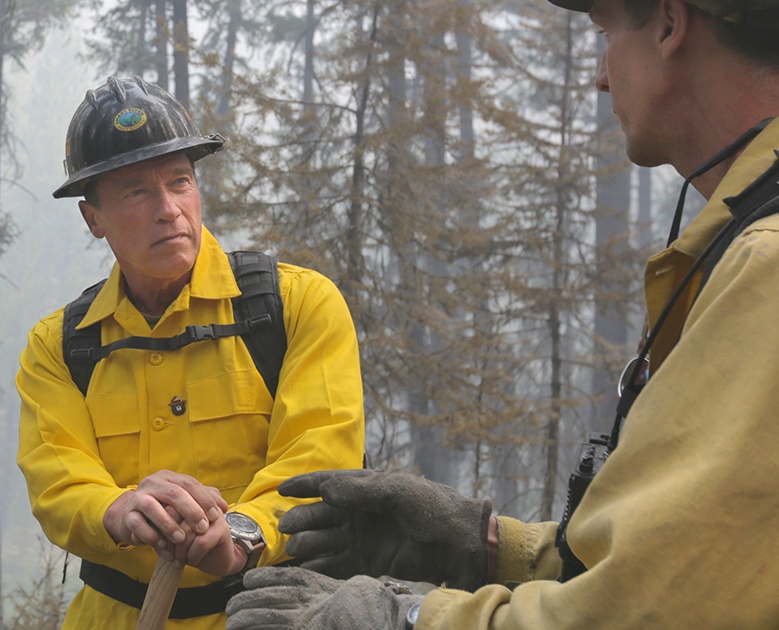Serena Mau | April 23, 2014
 Deforestation was the focus of Sunday night’s episode of Years of Living Dangerously, a Showtime series highlighting the biggest story of our time – climate change. In the episode, we followed Harrison Ford to different regions of Indonesia, including Tesso Nilo National Park, where forests are being destroyed to grow palm oil plantations. Palm oil, believe it or not, is an ingredient used in about half of the products on supermarket shelves. Ford shows the connection between deforestation and the consumer products we all buy at our local grocery store. We then followed Arnold Schwarzenegger, for a first-hand account of fighting California wildfires as he joins a team of “hotshots” (firefighters) to head off a fire that was threatening to destroy people’s homes. Hearing about “4 million acres of trees burned in 2013…with 2000 structures destroyed and $1 billion in damage” really brought home the immediate impact of wild fires.
Deforestation was the focus of Sunday night’s episode of Years of Living Dangerously, a Showtime series highlighting the biggest story of our time – climate change. In the episode, we followed Harrison Ford to different regions of Indonesia, including Tesso Nilo National Park, where forests are being destroyed to grow palm oil plantations. Palm oil, believe it or not, is an ingredient used in about half of the products on supermarket shelves. Ford shows the connection between deforestation and the consumer products we all buy at our local grocery store. We then followed Arnold Schwarzenegger, for a first-hand account of fighting California wildfires as he joins a team of “hotshots” (firefighters) to head off a fire that was threatening to destroy people’s homes. Hearing about “4 million acres of trees burned in 2013…with 2000 structures destroyed and $1 billion in damage” really brought home the immediate impact of wild fires.
Having lived in British Columbia and the Bay Area, California for most of my life, I have always enjoyed hiking in and visiting forested parks. It startled me to hear that we could lose 50% of our forests in the western United States over the next few decades due to forest fires and mountain pine beetle populations that are growing as a result of global warming. Arnold Schwarzenegger’s comment that there is no more wild fire season – we have wild fires all year round is especially worrisome in light of the severe drought we’re currently experiencing in California. The implication is that we will be seeing more barren mountaintops in the beautiful Sierra Nevada and an increasing number of hotshots will be needed to fight these fires. It makes me wonder, for the majority of the world that lives in urban areas, how do we make the connection that our day to day choices contribute to climate change? Most people would not think twice about purchasing a snack that contains palm oil. How do we ensure that we’re balancing the convenience of modern amenities with the need for sustainable living?
Part of the answer for me is the work that we do here at EDF Climate Corps. By placing graduate students within organizations like Office Depot, Caesars Entertainment, General Motors and DirecTV to implement energy efficiency, we are taking immediate steps to – as Schwarzenegger might say – terminate climate change. Our program is scaling our impact as we work with organizations on new pilot projects that look at the energy-water nexus and demonstrate the efficacy of advanced energy management practices such as demand response and battery storage technologies. Furthermore, we’re working to change behavior through employee and tenant engagement projects, and we’re bringing practitioners together to share best practices through our network. Like the hotshots that face these California wild fires together, we too can take steps to avoid the worst impacts of climate change by working together to improve building efficiency and reduce greenhouse gas emissions.
About EDF Climate Corps
EDF Climate Corps (edfclimatecorps.org) taps the talents of tomorrow’s leaders to save energy, money and the environment by placing specially trained EDF fellows in companies, cities and universities as dedicated energy problem solvers. Working with hundreds of leading organizations, EDF Climate Corps has uncovered nearly $1.3 billion in energy savings. For more information, visit edfclimatecorps.org. Read our blog at edfclimatecorps.org/blog. Follow us on Twitter at twitter.com/edfbiz and on Facebook at facebook.com/EDFClimateCorps.